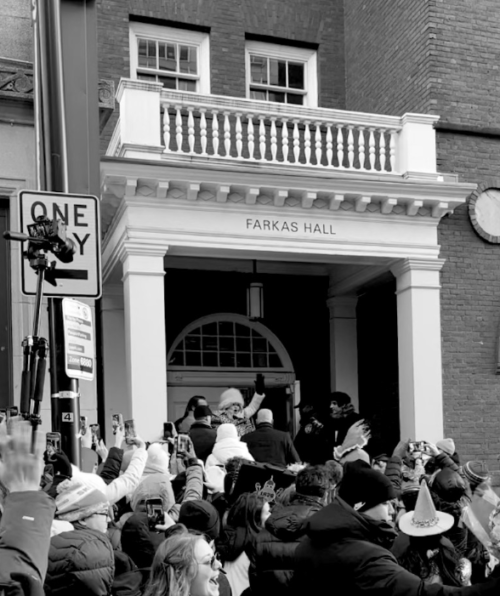You may have heard of Orson Welles’ Citizen Kane, arguably one of the greatest films in American history. But have you ever heard of his equally talented, yet often overlooked brother Worse N. Welles? Look no further than Hasty Pudding Theatricals’ (HPT) 174th production, Cosmic Relief to learn what happens when the ultra patriotic FBI agent, Lauren Order takes over the set of what Welles calls a “cult classic, pinot noir, pierogi western, psychosexual children’s[sci-fi] movie set on a moon of Saturn,” to fake the moon landing and defeat the communists.
The HPT website defines itself as the oldest American theatrical organization, performing original comedy musicals in New York City, Cambridge, and Bermuda since 1844. Famous for its self proclaimed “long tradition of daring social and political commentary, never shying away from controversial current topics,”Cosmic Relief was no exception. Pudding writers Maureen Clare ’23 and Matthew Cole ’24 upheld this reputation by crafting a story filled with dark humor and explicitly politically inspired content. This bold style of writing, along with the production’s captivating stage elements, costumes, and dancing makes Cosmic Relief a must-see for Harvard students.
The musical opens with the illumination of a shadow puppet through the Pudding’s red curtains which have a drawing of a personified moon with a rocket in its eye. The shadow is of a dog in a spacesuit—one of the puppies lost in NASA’s failed Apollo mission. Stage lights pan over to one of Farkas Hall’s balconies, drawing attention to a human-sized puppy with a bright pink ribbon on its head and bright red moon boots. Lassie, short for Lassie Ninorbette, is the helpless space puppy that waits for the rescue of FBI agent, Lauren Order, and NASA scientist, Noah Credited, Ph.D.
Characters like Lassie and Order help Cosmic Relief parody the Space Race and Red Scare of 1960s America. After Order is unable to produce a successful moon landing to aid the United States in outdoing the USSR, she is reassigned to monitor the activities of known communist director Worse N. Welles. Order’s character, as a representative of the FBI, remains suspicious of any political ideology that threatens her vision of American greatness.
Order’s political views, like many Harvard students, have been molded by her family environment. However, unlike many audience members, Order’s family included J. Edgar Hoover and Richard Nixon. HPT’s transformation of taboo subjects of family conflict, war, and ideology, into humor allows audience members to relate to the story.
Young Order feels unloved when her mother misses important moments in her life for political gatherings, ultimately leading to her betrayal of her mother and search for a new family in the FBI. She is so loyal to her new family that she recounts U.S. interference in Argentina and Brazil as “family vacations” and proclaims that “Nixon never lies.” She is even willing to fake the moon landing to guarantee the U.S.’s triumph over the Soviets in the Space Race.
Every character is written to reflect the historical period of the musical and has a personality that enables viewers to see reflections of themselves. If you have an ear for word play you will join the rest of the audience in laughing as each character is introduced.
One of the first actors Order meets when she pretends to be a movie producer is head extra Justin D’Backcrowned. Despite his acting skills he remains sequestered to the background of every set he has been on. His own insecurity prevents him from reaching his long term goal of becoming a renowned actor; and alternatively focuses his time on serving his girlfriend, Shirley. Many students can appeal to Justin’s character development of ultimately realizing his own potential from insecure beginnings.
Lead actress Shirley Uverdovme, aspires to follow her role model, Doris Day, in becoming a Hollywood star. Shirley resembles career driven young women who, in the face of gender discrimination and unequal pay, dream of becoming like their mentors. Shirley’s costume is definitely eye-catching: her sequin covered gold and red dress makes it clear that she aims to gain the love and attention of the audience.
Cosmic Relief’s youngest character is a little boy named Mannie Ventuallywillfall, who wears a curly, red wig reminiscent of little orphan Annie’s. Despite being an orphan, Mannie maintains a permanent smile. Of course, in true Pudding fashion, Mannie’s character also delivers the most cynical lines of the musical, including a solo about the inevitable implosion of the sun and the climate crisis. Despite what his positive demeanor may convey, he has his own personal turmoil related to the dissolution of his family upon the death of his parents.
Next is teen hearthrob and movie star Theodore Mee who hails from England and makes up for his airheaded nature with friendliness and creativity. Between acts he goes from not understanding how to count to unexpectedly taking charge in devising a plan to protect his fellow cast members from being detained by the federal government. Theodore also reminds us of how our personal objectives can easily shift, allowing us to discover the path we want to take in life.
Other characters include friendship loving hippie Aunty Establishment and the Queen of the 41st moon of Saturn, Esther Terrestrial. Even as the country is consumed with paranoia and the Cold War, the characters of Cosmic Relief are able to realize the importance of family, friendship, and authenticity.
I had the pleasure of watching HPT perform in the evening on Saturday, February 18th in Farkas Hall. If you are interested in seeing Cosmic Relief I suggest attending with a friend who will understand the historical references that many of the jokes center on. Additionally, it helps to be familiar with the pop culture references our generation grew up with. Even without this you should be able to enjoy the Pudding’s latest hit.
P.S. Stay after the show for a special treat from the Hasty Pudding band.
Adedoyin Adebayo ’26 (aadebayo@college.harvard.edu) writes Arts for the Independent.

